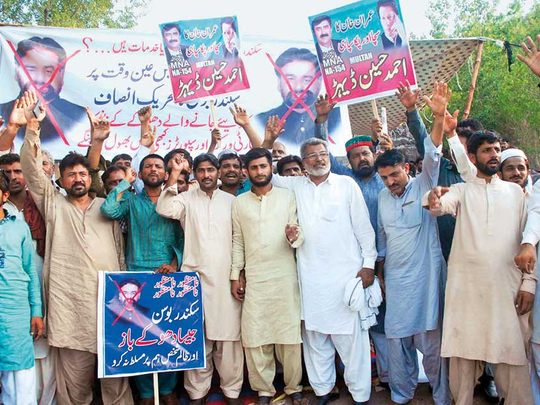
Islamabad: Pakistan Tehreek-e-Insaf (PTI) chief Imran Khan on Wednesday filed an appeal protesting the rejection of his nomination papers for the National Assembly-53 seat in the federal capital.
Justice Mohsin Akhtar Kiyani of the Islamabad High Court (IHC) will hear his appeal on Thursday. The PTI chief filed the appeal through his lawyer, questioning the verdict of the returning officer who rejected his nomination papers for NA-53.
Khan believes the decision to reject his papers is in contravention of the constitution and has requested that he be permitted to run for the NA-53 constituency seat.
In his appeal, Khan maintained that he is the head of one of the biggest political parties and his nomination papers had been rejected on weak grounds. Imran submitted that he did not hide anything in the nomination papers.
Khan’s papers were rejected by the returning officer on Tuesday. The returning officer also rejected the papers of Pakistan Muslim League-Nawaz leader Shahid Khaqan Abbasi and Ayesha Gulalai, who seeks to run for the NA-53 constituency.
Meanwhile, the Election Commission of Pakistan (ECP) revealed that 1,691 women candidates have filed nomination papers for the 2018 general elections, a marked increase over the 1,171 women who did so in 2013. Of these, 436 are vying for National Assembly seats while 1,255 are eyeing provincial assembly seats.
According to official ECP data, Punjab took the lead with 664 women candidates vying for provincial assembly seats — a huge jump when compared to the 231 who stood in the last elections.
At a national level, 236 women from the province are running for National Assembly seats compared to 123 candidates in 2013, an ECP official said.
Khyber Pakhtunkhwa is in second position, with 88 women filing nomination papers for National Assembly seats as compared to 78 last time, and 262 for the provincial assembly as compared to 229 in 2013.
Women in Sindh bucked the trend, with 76 vying for National Assembly seats, down from 99 in 2013, while 213 women submitted papers for the provincial assembly polls as compared to 247 in the previous election.
Sindh was joined by Balochistan, where only 36 women filed nomination papers for National Assembly seats, their number dropping 50 in the last election. The province registered a marginal increase for the provincial elections, with 116 stepping forward this time compared with 114 last time.
CCTVs
Meanwhile, closed-circuit television cameras (CCTV) will be installed at all sensitive polling stations across the country.
According to the ECP, it will be responsibility of the provinces to install CCTV cameras in their respective areas to ensure peaceful polling.
The government of Khyber Pakhtunkhwa will provide funds for the installation of CCTV cameras at polling stations in Federally Administered Tribal Areas (FATA) areas.
All district returning officers, returning officers, assistant returning officers, provincial elections commissioners, regional elections commissioners, district election commissioners and training centers will be provided with tight security.
It was also decided that provinces will make security arrangements for political leaders and candidates contesting the elections.
Close coordination would also be maintained with the National Counter Terrorism Authority.
The Election Commission of Pakistan will ensure the full implementation of the Code of Conduct of elections. The commission expressed satisfaction over security arrangements so far devised for the general election.












